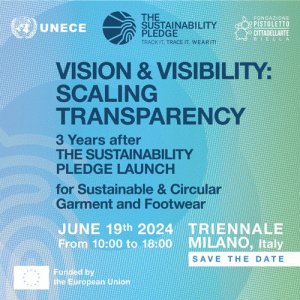
Three years ago, the European Union and UN Member States challenged UNECE to demonstrate that traceability and transparency were possible in the clothing and footwear sector. Today, after more than 20 project pilot projects, and 110 pledges from leading brands, manufacturers, non-governmental organizations, industry associations and sustainability initiatives in almost 30 countries, UNECE has demonstrated the positive impacts of tracing cotton, leather, synthetic, cellulose and wool-based products throughout the world, from production to use, and beyond.
The lessons of the past three years under The Sustainability Pledge initiative are discussed today during the event “Vision & Visibility: Scaling Transparency” at Triennale Milano, gathering over 200 partners for a day of open sessions and workshops. UNECE is marking the day with the launch of its “Community of Practice” to scale up the best practices and common sustainability solutions for the industry.
“The Sustainability Pledge has demonstrated our ability to trace products from their origin to the end consumer,” noted UNECE Executive Secretary Tatiana Molcean. “This represents a crucial step towards creating a more sustainable and accountable apparel and footwear sector. I call on all players in the industry to join our Community of Practice to contribute to the collective effort to implement transparency and traceability at scale."
The clothing and footwear industry is a major contributor to environmental degradation and global warming. This sector is also known for poor working conditions that often violate human rights. Many workers, especially women, young people, homeworkers, and migrants, often operate in conditions below international standards.
Despite this, the demand for clothing and footwear continues to grow annually. To address these issues, it is essential that the sector leads the environmental and social transition to improve the lives of people and achieve the Sustainable Development Goals (SDGs) 5, 8, 13, 15 and 17.
Through collaborative work with over 800 of experts, policymakers, businesses, members of academia and NGOs, UNECE has developed a set of policy recommendations, guidelines, and standards to enable industry players to authenticate their sustainability claims. They allow all actors in the sector, including consumers, to improve transparency and traceability across the value chain, from field to factory to store, through a free open-source framework. These systems have been put to the test in pilot projects, exploring the supporting role that innovation and advanced technologies, such as blockchain and DNA traceability, can play.
At each key stage of the manufacturing process, information is stored in the blockchain, creating an immutable record for tracking and tracing information. Materials and products can be identified and localized at the source thanks to the information exchange standard and the open source blockchain system, which allows even small producers with only a smartphone to upload their data to the blockchain.
Three years of the Sustainability Pledge: just the beginning
Since 2021, The Sustainability Pledge has succeeded in becoming the convening platform to advance globally towards a more traceable, transparent, and sustainable apparel and footwear sector. With members from academia, civil society, international organizations, suppliers, manufacturers and retailers, it can count on a large variety of committed companies, from micro-enterprises, to small, medium and large enterprises, which engage in traceability and transparency actions across all continents.
At the event in Milan UNECE is also launching ‘’The Sustainability Pledge 3-years monitoring report,’’ which provides the Community of Practice with an overview of the industry best practices to enhance traceability and transparency in the garment and footwear sector.
The report presents The Sustainability Pledge facts and figures, based on the analysis of key data about the 100 pledges submitted to UNECE, progress and impact achieved in the last three years, including the drivers and challenges faced by industry actors. The development of Key Performance Indicators (KPIs) at corporate, product and material levels and tailored recommendations strengthen the overall report with a clear indication for the industry on how to measure traceability and transparency.
The Sustainability Pledge is fueling future legislation to regulate the clothing industry. By tracking clothes, it has supported local production around the world and supported consumer choices with the information they demand.
The Community of Practice aims to accelerate traceability and transparency initiatives and share best practices to shift changes at scale in the apparel and footwear industry.
Note to editors
-
Complete programme and speakers are available here.
-
Join us online here.

